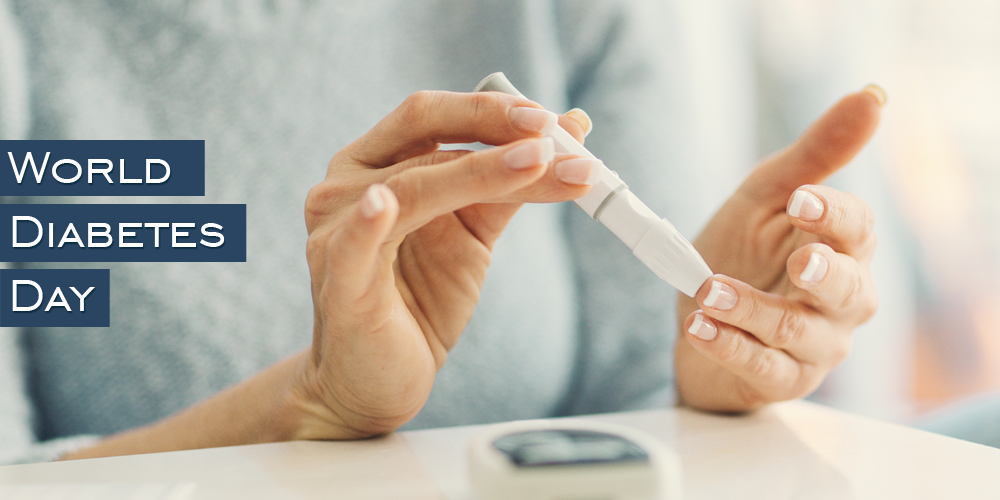Diabetes is a chronic, devastating and sometimes fatal disease, in which the body either cannot produce insulin or cannot properly use the insulin it produces. Insulin is a hormone that controls the amount of glucose (sugar) in the blood. Diabetes leads to high blood sugar levels, which can damage organs, blood vessels and nerves. The body needs insulin to use sugar as an energy source.
14th November was chosen as “World Diabetes Day” as it coincides with Frederick Banting’s birthday, the man who, along with Charles Best and John James Rickard Macleod, conceived the idea that led to the discovery of insulin in 1922. This was a remarkable achievement in the treatment of diabetes.
Types of Diabetes:
Type 1 diabetes
Type 1 diabetes occurs when the immune system mistakenly attacks and kills the beta cells of the pancreas. No, or very little, insulin is released into the body. As a result, sugar builds up in the blood instead of being used as energy. About 5 per cent of people with diabetes have type 1 diabetes. It generally develops in childhood or adolescence, but can develop in adulthood. Type 1 diabetes is always treated with insulin. Meal planning also helps with keeping blood sugar at the right levels.
Type 2 diabetes
Type 2 diabetes occurs when the body can’t properly use the insulin that is released or does not make enough insulin. As a result, sugar builds up in the blood instead of being used as energy. About 95 per cent of the people with diabetes have type 2 diabetes. It often develops in adults, but children can be affected.
Depending on the severity of type 2 diabetes, it may be managed through physical activity and meal planning, or may also require medications and/or insulin to control blood sugar more effectively.
Gestational diabetes
A third type of diabetes, gestational diabetes, is a temporary condition that occurs during pregnancy. It affects approximately two to four per cent of all pregnancies and involves an increased risk of developing diabetes for both mother and child.
Diabetes and some complications
Having high blood sugar can cause diabetes-related complications, like chronic kidney disease, foot problems, non-traumatic lower limb (leg, foot, toe, etc.) amputation, eye disease (retinopathy) that can lead to blindness, heart attack, stroke, anxiety, nerve damage, and erectile dysfunction (men).
Diabetes-related complications can be very serious and even life-threatening. The earlier a person is diagnosed with diabetes the better it is. Properly managing blood sugar levels reduces the risk of developing them.
Did you know?
Nearly one in two, 46 per cent of the 415 million adults living with diabetes are unaware of their condition. Most of these cases are type 2 diabetes. World Diabetes Day aims to highlight the need to screen, diagnose and provide appropriate treatment to people with diabetes across countries. “Eyes on Diabetes” is the theme of World Diabetes Day this year. It is a call for action to screen people at the risk of type 2 diabetes.
Risk factors for developing diabetes:
- Excess weight
- Family history
- Sedentary lifestyle
- Unhealthy diet
- Poor nutrition during pregnancy
- High Blood pressure
- Ethnicity
Early lifestyle intervention can protect your future health and reduce health costs required to treat complications.Up to 70% of type 2 diabetes cases can be prevented or delayed by adopting healthier lifestyles.
Diabetes, some facts you need to know:
- Type 2 diabetes often does not have any symptoms.
- Only about five percent of all people with diabetes have type 1 diabetes.
- If you are at risk, type 2 diabetes can be prevented with moderate weight loss and 30 minutes of moderate physical activity (such as brisk walking) each day.
- Diabetes is the leading cause of blindness in working-age adults.
- People with diabetes are twice as likely to develop heart disease than someone without diabetes.
- Bariatric surgery can reduce the symptoms of diabetes in obese people.
Diabetes and India
The number of people with diabetes in India has nearly quadrupled since 1980.There strong evidence that Indians have a greater degree of insulin resistance and a stronger genetic predisposition to diabetes. There were 69.1 million cases of diabetes in India reported in 2015.
Get yourself checked this World Diabetes Day. As a nation we must be more aware about the risks of developing Type 2 diabetes and take measures to prevent it. Visit Kokilaben Dhirubhai Ambani Hospital for a check up of your blood sugar levels. Our centre of Diabetes and Obesity is well equipped to take care of all diabetes patients. Please check the below link for further details:
https://www.kokilabenhospital.com/departments/centresofexcellence/centrefor_diabetesobesity.html


